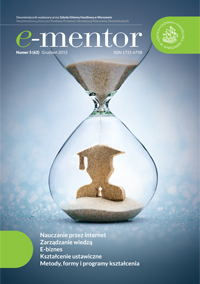E-badania - analiza wybranych problemów internetowych badań postaw i opinii
E-research - selected issues concerning the Internet attitudes and opinions research
Author(s): Konrad KulikowskiSubject(s): Social Sciences
Published by: Szkoła Główna Handlowa w Warszawie, Fundacja Promocji i Akredytacji Kierunków Ekonomicznych
Keywords: e-research; attitudes and opinions research; online survey tools; non-response error; sensitive issues
Summary/Abstract: Internet research of attitudes and opinions have become extremely popular not only among researchers, but also in business and education. This is mainly due to increased access to the Internet in society and availability of affordable and easy-to-use online survey tools. Therefore, it is important to summarize contemporary knowledge about creating and conducting research in the online environment and to present clear recommendations and best practices. The author of this article tried to answer five common questions which arise in online research practice: How to maximize the number of completed questionnaires? How to invite people to participate in the Internet study? Whether to use suggestive question? How to minimize non-response error? How to ask question about sensitive issues? Additionally, the importance of pilot studies was highlighted. In order to find valid and accurate answers to presented questions, a review of the scientific literature reporting the results of empirical studies relating to the Internet research methodology was conducted. Contemporary literature review allowed putting forward specific recommendations, as well as heuristic guidelines for the Internet research supported by empirical findings. Thus, this paper can contribute to improving the quality of data collected during studies via the Internet. The final result of online research depends on a number of factors appearing on the stage of: creating, transferring, filling out and returning the questionnaire. Although there is no simple way to predict and solve all possible problems and issues, following the recommendations presented in this article may significantly reduce number of potential issues in online studies.
Journal: e-mentor
- Issue Year: 62/2015
- Issue No: 5
- Page Range: 21-28
- Page Count: 8
- Language: Polish

